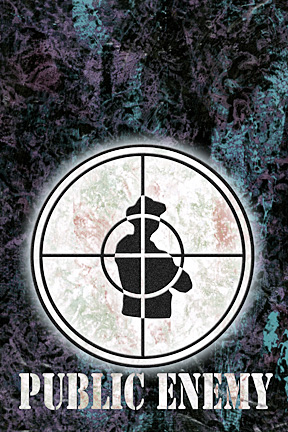 AUG. 19/20/21 |

PHOTO ILLUSTRATION
BRYANT FUKUTOMI / BFUKUTOMI@STARBULLETIN.COM |
Public Enemy
makes return
Another blockbuster show is
expected from the rap group
The originals are still the best! It's been 16 years since Chuck D and Public Enemy were here in Hawaii for a concert at the former Pier 10 Ballroom at Aloha Tower. On that visit, early in 1989, we talked about the group's breakthrough album, "It Takes a Nation of Millions to Hold Us Back," and PE's commitment to resisting all forms of oppression.
The Hawaii Hip-Hop FestivalFeaturing Public Enemy, with Spookahuna, Parccyde, Jbird, Christyles and the Tiki AllstarsWhere: Kapiolani Community College, 4303 Diamond Head Road When: 1 p.m. Friday Tickets: $25 Call: 1-877-750-4400 or go online at www.ticketmaster.com
|
Expect another blockbuster performance when Public Enemy returns to Hawaii as the headliners of what hopes will be the 1st Annual Hawaii Hip-Hop Festival on Friday. Local acts Spookahuna, Parccyde, Jbird, Christyles and the Tiki Allstars will open the show.
"We're probably the most dynamic rap show they've ever seen," said Chuck D by long distance earlier this week. "I don't know how to explain it. It's not like me tooting my horn because it's not about me. It's an event."
Public Enemy is stopping in Hawaii on the way home from a tour of Asia, and although they've been, as Chuck D puts it, "underneath the national radar," they're as busy as ever.
Eighteen months of "woodshedding" had produced four new albums, five DVDs and a record label, SLAMjamz, that is home for 14 acts. SLAMjamz will release three Public Enemy studio albums within the next year. The first, "New WHIRL Odor," will be out in October.
Other projects include a "Power to the People and the Videos: The Great Videos of PE" DVD and "Rebirth of a Nation," produced by Paris, another significant political rap artist, for his Guerrilla Funk label.
Chuck D is also expanding worldwide via off-line digital, co-hosting a weekly radio show, "On the Rea" for liberal talk radio Air America, and writing lengthy, thought-provoking essays for the group's Web site at www.publicenemy.com.
"What people don't understand is Public Enemy is like the Rolling Stones of rap and hip-hop. We tour the world whether we're on the radio or not. We have three albums coming out in the next 18 months, whether a hit single comes up out of it or not, and that's a Rolling Stones comparison as well. You go see the Rolling Stones regardless of their new record. When Keith Richards starts playing, it's all over."
Chuck D notes that there have been a couple of personnel changes since Public Enemy hit Hawaii in 1989. Terminator X was replaced by DJ Lord several years ago, and the show now includes a live trio that works with the deejay to become "almost like hip-hop's version of a funk jam band."

Chuck D, second from left, of Public Enemy says the group "is like the Rolling Stones of rap and hip-hop." Public Enemy is headlining a hip-hop festival Friday at Kapiolani Community College.
And speaking of the media, although such seminal rap albums as "It Takes a Nation of Millions ... " and "Fear of a Black Planet" made Public Enemy cultural icons in the late-1980s, most of black radio found gangsta rap and sexually explicit booty music more marketable than PE's call for racial unity and political consciousness.
The mainstream also jumped on gangsta rap and other subsequent genres of urban music that reinforced stereotypical images of African-American culture.
Chuck D describes the mass media's fascination with gangbangers, pimps and hos as "A fish-tank kind of thing fueled by a media that's more likely on the outside curiously looking in. Negative connotations have always been attached to black folks, in the United States of America especially, so why wouldn't something negatively connected work better than something that was positive and uplifting? But that's always been the case."
In contrast, Public Enemy came out of the desire to do something original that would also be positive and uplifting, even if it didn't sell.
"Musical transitions usually happen when people dare to be different and take on something and not even care about who loves it and who doesn't love it. There was a lot of absence regarding black folks and our placement inside the building of civilization (in the early 1980s). In the absence, we also realized that there was a thirst for our culture, so why not line it up? We didn't invent that wheel at all. There's people way before us that created that and put it in the music. All we did was use technology and the visual aids available come '88 and '89, to use images and words and music, and combine them to have something that sparks some kind of curiosity. Once people's curiosity is sparked, then individuals have to begin that learning quest."
PUBLIC ENEMY'S message, combined with the visual iconography provided by their uniformed S1W escorts, and a logo that showed a black man in the cross-hairs of a rifle scope, didn't sit well with the establishment. Some got scared, others may have been nervous or angry, when the group revisited the assassination of Malcolm X, demanded equal rights for black Americans, and included Louis Farrakhan, as well as Martin Luther King, on an honor roll of African-American leaders.
"We were a collective of black men. We didn't claim to be any 'boys.' Whether we were in uniform, or whether we're wearing the hat backwards, we were a collective of black men, whether the seriousness of myself or even Flavor Flav. He has the ability to scare people even with his humor and his gold caps."
Despite the animosity, PE continues to speak out and, taking a line from one of their most famous diatribes, "fight the powers that be."
Chuck says the biggest change in the music industry since "It Takes a Nation of Millions ... " is the willingness of many rap acts these days to copy each other.
"Hip-hop started as a sense of never repeating itself, and in copying the rock-and-roll credo of cats finding their niche in their own individuality ... and now artists kind of aspire to the wants and needs of their contracts and their record companies. They strive to be similar, whereas in the beginning, everybody strove to be different. When people strive to be similar, then what you have is a situation where a lot of people are doing something that doesn't even line up with their own beliefs.
"When gangsta rap emerged, it didn't mean that any of these cats were actually gangsters at all. They could be talking about the life and everything about it, but you don't have to build on it. All you have to do is continuously say the same thing over and over again and indoctrinate the listener. ... When it comes down to Public Enemy and hip-hop, we're the closest thing to rock climbers that you can find. But we don't rest on our laurels. We know we gotta rock the house with the power and the glory, and also The Word."
E-mail to Features Desk
[News] [Business] [Features] [Sports] [Editorial] [Do It Electric!]
[Classified Ads] [Search] [Subscribe] [Info] [Letter to Editor]
[Feedback]
